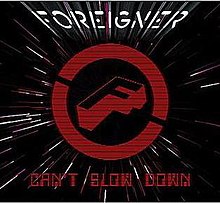
When I make a decision on a recording, I’m usually confident in that decision – so much so that it surprises me when I revisit said recording years later to see if my opinion has changed. Nine times out of ten, my original conclusion stands.
I do believe that a writer who deals with these matters should go back and attempt to reassess things, especially when the verdict comes in digital form. Versions of these opinions can last for generations, if not on the originating website, then in some digital archive for posterity. And because people change, grow more mellow, and perhaps move into the mindset the creator of said piece was in and now could feel a sliver more kinship with it, it is almost an imperative to make sure our final word is still accurate.
By and large, my view of Foreigner’s Can’t Slow Down album still is. Celebrating its tenth anniversary, the album came fifteen years after the previous Mr. Moonlight, a reunion with original vocalist Lou Gramm but also the last album to be recorded with Gramm. Can’t Slow Down has only one original member left, being Mick Jones, and with that being the case, one might expect the guitar passages on this disc would be over and above. Such is not the case.
And that is one of the defining problems with the record. There are others, of course.
I suppose the minimal issue comes from the lyrics being as rigidly meat-and-potatoes as they are, but that comes with the realization that this never was a band featuring earth-shattering wordsmithing. Typically, the words were all Gramm needed to move the song along, and his voice carried the day on many of the band’s biggest hits. Yet, from “The Damage Is Done” to “I’m Gonna Win” on to “A Night To Remember,” subtlety and poetry seldom entered into the picture.
So it is with Can’t Slow Down, only boiled down to ever more plainspeak. It helps that new(er) vocalist Kelly Hansen sounds far more like Gramm than he ever did with previous band Hurricane. It also helps that no one expects lyrical grandeur from Foreigner. They expect a vibe, a specific feeling, and there are many times on the record where they nearly achieve that…but only nearly.
Take for example the track “In Pieces,” which already treads heavily worn territory. It has that Foreigner groove, but the song and record in full were calculated for 2009’s version of modernity. What I mean by that is that song structure followed the diktats of the pop charts then, where the biggest producers codified what would now be the standard practice: seemingly, recording the backing instrumental and then having the singer go over the top of it. This results in songs where the band is not in unison so much as one wing of it runs the show and the other contributes like they’re lucky to be there, barely a “feature” slot on their own band’s record.
This is readily heard on one of the better tracks on the disc, “Give Me A Sign.” With the benefit of some brass accompaniment, the song seems ready to take off into the stratosphere, especially behind a catchy chorus, but there’s no instrumental break, no guitar solo. Everything merely barrels on to the end, and this, I believe, is that big defining problem I mentioned earlier. Mick Jones is in complete control of this album, with nary another tenured member keeping him down, but any moment where a juke box hero guitar part ought to be is either excised or replaced by a keyboard line.
That’s frustrating. The original lineup of the band not only had Jones, previously of Leslie West’s band and the group Spooky Tooth, but former members of King Crimson and later David Gilmour’s solo group. They regularly had Ian Lloyd, vocalist for the group Stories, doing background vocals. Furthermore, even the members you didn’t recognize by name were monster players. Foreigner was a pop-rock band with a prog rock pedigree, and here we have the most condensed, reductionist version of that in Can’t Slow Down.
I hoped – as I popped the disc into my player – that my opinion of it had changed over the decade. I was ready to be won over rather than being disappointed that this one original effort, away from a zillion “best of” and “live” recyclings the band is now derisively known for, wasn’t time well spent. It only girds the belief that the ten-year-plus gaps between new material isn’t because the band doesn’t want to, but because they can’t. For a record titled Can’t Slow Down, that’s bitterly ironic.
It’s okay. It’s not awful, but my original impressions must stand. I went back to this album not to negatively criticize it a second time, but to find something worthwhile for the first time. Feels like I shouldn’t have bothered.